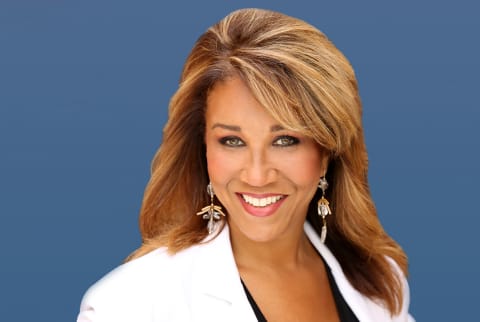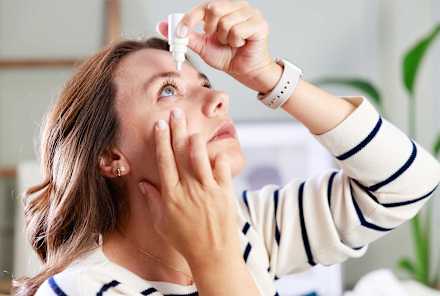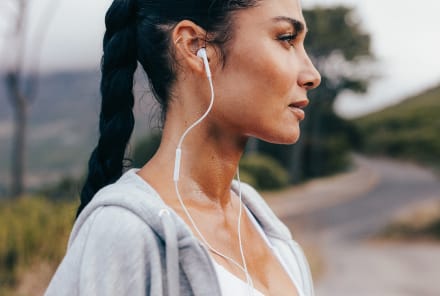Advertisement
This MD Lost 100 Pounds By Balancing Her Hormones: Here's Exactly How She Did It


Two years ago, board-certified OB/GYN and functional medicine specialist Kyrin Dunston, M.D., was exhausted. Like, lights-on-no-one's-home, exhausted. "I weighed 243 pounds at one point and suffered from fibromyalgia," she tells me on this episode of the mindbodygreen podcast. "I was tired all the time, I had depression and anxiety, and my hair was falling out."
Fast-forward to today, and you'd absolutely never know it. She shed 100 pounds, feels energized and lively, and her hair grew back full and shiny. "I looked 20 years younger," she explains. "I was unrecognizable."
Although it wasn't a specific diet or exercise plan (in fact, Dunston notes, she barely exercised at all) to get to where she is today. "All the tools I had been taught weren't really restoring my health, helping me lose weight or feel better," she adds. "They were Band-Aids on symptoms." What did help, she notes, was addressing the plethora of hormonal imbalances that lay just underneath the surface.
Here's how balancing her hormones helped Dunston get her life back on track.
Which hormones did Dunston focus on?
"[Hormone imbalances] are kind of like ants—there's never just one," she says. "They work together like a symphony." That being said, this list only scratches the surface, but here are some significant hormones that she deems important to keep under control:
- Thyroid: "Thyroid is top of the list," says Dunston. "It sets the rate at which your body burns fuel. The thyroid tells your body to open up the fat and get that fuel going." That's why if you can't seem to shake stubborn weight, Dunston says your thyroid might be to blame—without burning fat for fuel, you won't effectively lose weight.
- Cortisol: "Cortisol is the mother of all hormones," she says. "It determines our sleep-wake cycle, energy, weight, and immune system—it is so vital." Specifically, cortisol is in charge of your stress response. When your body is constantly in survival mode (looking at you, blood sugar roller coaster), cortisol will tell your body that you need to eat—and right now.
- Progesterone: Once cortisol is out of balance, the sex hormones aren't too far behind. That's because your body has to have cortisol at all costs, whereas the reproductive hormones are more extraneous, says Dunston. "It pulls on your sex hormones," she says. And, says Dunston, a drop in progesterone can lead to heavy, painful periods and even an increased appetite1 for some.
How she balanced these hormones.
Dunston focused on three key factors to help harmonize her hormones. Full disclosure: Balancing these hormones won't happen overnight. But these to-do's are a sure start:
She focused on sleep.
The No. 1 thing, according to Dunston, is to prioritize high-quality sleep. "There are certain activities your body undergoes when it is sleeping, and you can't do any other time," she explains. One of which is the deep brain waves involved in resetting cortisol rhythm: "Your cortisol is restored and nurtured when you sleep," she adds.
She hopped off the blood sugar roller coaster.
The second most important to-do, says Dunston, is to stop oscillating between blood sugar spikes and crashes. "Every time your blood sugar comes crashing down, you might as well be punching yourself in the adrenals," she notes. When your blood sugar goes too low, it sounds the survival alarm and cortisol comes in, telling you to eat. Then your blood sugar slings up, then down again, and the nightmarish process repeats.
The solution? Focus on foods that won't cause your blood sugar to go haywire, and stick to whole carbs.
She focused on diet and supplements.
Dunston touts ashwagandha, rhodiola, ginseng, and vitamin C as great hormone-supporting supplements, as well as anti-inflammatory actives like curcumin and quercetin. Specifically for cortisol, vitamin C is a key player: "You can't store vitamin C, and you need a constant supply to make cortisol," Dunston says.
"I also started using castor oil packs on my adrenal glands," she adds, which have anti-inflammatory effects2 that can support the adrenals (aka, where your cortisol is made). "I put them on my lower back with a heating pad for 20 minutes a day."
Adrenal glands are also "intimately involved in gut health," says Dunston. That's where diet comes in: She recommends gut-healthy foods like dark, leafy greens and lots of brightly colored vegetables. If you do eat animal protein, she suggests eating grass-fed, organic, and wild-caught sources.
The takeaway.
Like Dunston, if you can't seem to shake stubborn weight, your hormones might be to blame. Of course, this is one woman's story, and what worked for Dunston might not be your exact plan of action. You may need something a little different—and that's OK! Try to figure out which of your hormones need a little more TLC. And if you still have lingering doubts? Well, that's what experts like Dunston are for.
Enjoy this episode sponsored by CVS! And don't forget to subscribe to our podcast on iTunes, Google Podcasts, or Spotify!
Watch Next
Enjoy some of our favorite clips from classes
Enjoy some of our favorite clips from classes
What Is Meditation?
Mindfulness/Spirituality | Light Watkins
Box Breathing
Mindfulness/Spirituality | Gwen Dittmar
What Breathwork Can Address
Mindfulness/Spirituality | Gwen Dittmar
The 8 Limbs of Yoga - What is Asana?
Yoga | Caley Alyssa
Two Standing Postures to Open Up Tight Hips
Yoga | Caley Alyssa
How Plants Can Optimize Athletic Performance
Nutrition | Rich Roll
What to Eat Before a Workout
Nutrition | Rich Roll
How Ayurveda Helps Us Navigate Modern Life
Nutrition | Sahara Rose
Messages About Love & Relationships
Love & Relationships | Esther Perel
Love Languages
Love & Relationships | Esther Perel
What Is Meditation?
Box Breathing
What Breathwork Can Address
The 8 Limbs of Yoga - What is Asana?
Two Standing Postures to Open Up Tight Hips
How Plants Can Optimize Athletic Performance
What to Eat Before a Workout
How Ayurveda Helps Us Navigate Modern Life
Messages About Love & Relationships
Love Languages
Advertisement

This Is The Real Reason You Look In The Mirror When You Cry, Experts Say
Jackie Newgent, RDN, CDN

Can Vitamin C Actually Shorten A Cold? What's Fact vs. Fiction
Molly Knudsen, M.S., RDN

This Is The Real Reason You Look In The Mirror When You Cry, Experts Say
Jackie Newgent, RDN, CDN

Can Vitamin C Actually Shorten A Cold? What's Fact vs. Fiction
Molly Knudsen, M.S., RDN

This Is The Real Reason You Look In The Mirror When You Cry, Experts Say
Jackie Newgent, RDN, CDN

Can Vitamin C Actually Shorten A Cold? What's Fact vs. Fiction
Molly Knudsen, M.S., RDN

The 8 Best Tests To Diagnose A Hormonal Disorder (That Most Docs Don't Order)
Romie Mushtaq, M.D., ABIHM

This Is The Real Reason You Look In The Mirror When You Cry, Experts Say
Jackie Newgent, RDN, CDN

Can Vitamin C Actually Shorten A Cold? What's Fact vs. Fiction
Molly Knudsen, M.S., RDN

The 8 Best Tests To Diagnose A Hormonal Disorder (That Most Docs Don't Order)
Romie Mushtaq, M.D., ABIHM













